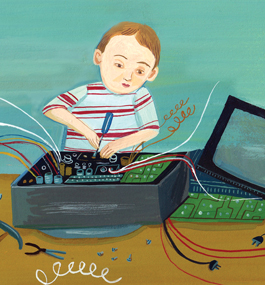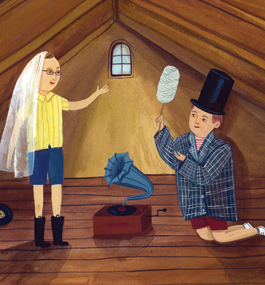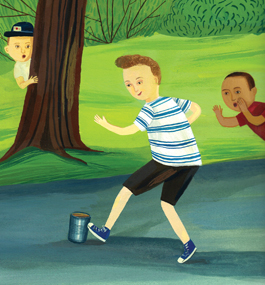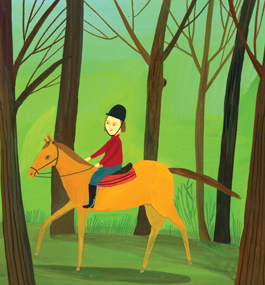Play’s the Thing
If the child is father to the man, then our childhood pastimes show us who we are.

Giselle Potter
Brandeis Magazine asked a variety of Brandeisians — alumni and faculty — to talk about what they played as a child and how those diversions shaped them.
You’d expect, of course, to find a general connection between the interests of the grown-up and the interests of the kid — a love of sports, a passion for books. But, to a surprising extent, the recollections offered here are more like looking into a mirror.
Left to their own devices, children reveal the clear signs of complex hearts and minds. And child’s play is actually wonderfully serious business.
Down to the wire
I used to pick old radios and junked TV sets out of trash cans in the early ’80s, before lawyers forced electronics companies to affix warning labels promising imminent doom to anyone who opened up the components.
With a set of small screwdrivers, I’d unpack the layers like an onion — a circuit-board panel of multicolored wires would make way for mini-transformers, which would reveal a paper speaker. Each part was a story, something to figure out. How does this work? Why is it there? What happens if I touch this? Ouch!
Today, I unpack metaphorical radios and TVs — dissecting ideas and stories, built from different components, that lead to places of discovery and adventure. Curiosity and wonder are two things most children have intuitively. Most of us adults have to work hard to keep them.
— Guy Raz ’96, host and editorial director, NPR’s “TED Radio Hour”
The pretenders
Blessed with benign neglect, no TV and just a few open-ended toys, my friends and I played in the magical kingdom of our imaginations, staying in a sense of flow for hours and hours, days on end.
Inventing complex plots, dialogue and props, how we loved acting out pirate adventures, cops and robbers, and Wonder Woman, or playing hide-and-seek and tag.
Pretending often saved the day when I played baseball games with my three brothers. With only four of us, we sometimes invented fantasy players for our teams, visualizing them for a full nine innings’ worth of striking out, stealing second base and hitting home runs.
The power of play shaped the adult I became (I enjoy collaborating, improvising and risk taking). It also became the central passion of my professional life. Whether creating simulated realities in a classroom or founding and directing a children’s museum, I develop play environments that nurture children’s imaginations, fuel their human potential and help them be inventive thinkers throughout their lives.
Play is children’s work. Work is my play.
— Dolores Kohl ’55, Brandeis trustee and founder of the Kohl Children’s Museum of Greater Chicago

Giselle Potter
page 2 of 4
Bright lights
In sixth grade, I spent most of my time after school at my friend Jeffrey Kamowitz’s house, listening to records on a gramophone he’d inherited from his grandmother.
We listened to a scratchy recording of Jeffrey’s favorite opera, “Boris Godunov,” every afternoon for nearly a month. Jeffrey liked opera. I did not. I thought opera was a bit hyper, though I wasn’t sure if “hyper” could be an adjective as well as a prefix.
In the fall, our school organized a trip to the Met to see a matinee performance of Verdi’s “Rigoletto.” When Jeffrey asked me if I’d liked it, I told him I thought it was “bombastic.” Jeffrey said he thought the singing was the best he’d ever heard. “Yes,” I said, “but the acting was over the top.”
Operas led to plays. Along with other kids from the neighborhood, we staged plays in Jeffrey’s attic. His living room was off-limits; the furniture was wrapped in plastic. Eventually, we put on plays at school.
As an Oxford undergraduate, I was cast as Mephistopheles in a series of benefit performances of Christopher Marlowe’s “Doctor Faustus,” produced in 1967 by the Oxford University Dramatic Society. Richard Burton was Faustus, and Elizabeth Taylor was Helen of Troy. When Columbia Pictures decided to make a film of “Doctor Faustus” that summer at the Dino De Laurentiis Studios in Rome, Burton — perhaps due to a lapse in consciousness — insisted I be in that, too.
The movie led me to appearances on national TV, including on “I Spy” with Bill Cosby and Robert Culp, and “The Big Valley” with Barbara Stanwyck. From an attic in a small town outside New York City to the Warner Bros. back lots in Burbank, Calif. From playacting to Hollywood.
— Andreas Teuber, associate professor of philosophy
Flying the coop
For me, two of the most fun words in the English language are “road trip.” When I was growing up on a chicken farm in rural Connecticut in the late 1950s and ’60s, my parents would take my two siblings and me on long drives to visit relatives in such “exotic” places as New York, New Jersey, Pennsylvania and Montreal.
I still take lots of trips — only this time, the destinations truly are exotic (Morocco is next on the agenda). Visiting family in faraway places is always extra-special, like it was when I was younger. During my most recent time in Israel, my nephews, niece and I drove Segways through Jerusalem, an unplanned but unforgettable adventure, which we luckily survived. Road (and plane) trips remind me that the thrill of travel is not gone — it’s a major source of inspiration, creativity and joy.
— Lisa Kranc ’75, Brandeis trustee and retired senior vice president of marketing, AutoZone
The embrace of stories
As long as I can remember, books have fascinated me. During my very early years, I spent many hours each day in my mother’s lap while she read to me. But, although words were essential to my daily diet, I started reading quite late. I imagine that was, at least in part, because I was loath to leave my mother’s warm embrace and the exciting worlds she created.
Once I learned to read, reading became an obsession, a daily ritual that has steadied me through many difficult times. I cannot imagine ever being lonely as long as I have access to books.
My 4-year-old son has followed suit. His eyes light up whenever he sees a new title, and, though he can barely draw a straight line, he has been reading fluently for some time now.
The hours we spend close together, reading or discussing characters or stories, are a gift to me, for I get a deep insight into his wonderfully imaginative and practical mind. They’re also my gift to him, a sign of my focused attention and deep love.
— Devika Mahadevan ’00, board member and former CEO, Mumbai Mobile Creches, which aids migrant workers’ children in India

Giselle Potter
page 3 of 4
Catch as catch can
Most pieces of my D.C. childhood — Fort Reno, the Biograph, the Jolly Ranchers I got at the Broad Branch Market — enjoy a solid Web presence. But there’s not much on the Internet about the game we played on Livingston Street from the moment we dumped our schoolbooks till the last four kids got called in for dinner. Three hours a day, 150 days a year — I happily wasted about 2,000 hours of my life trying to kick a can.
I could tell you Kick the Can’s rules in 30 seconds — how “It” guards the can, and how when you hear “One, two, three on John behind the Draynes’ porch,” you know you’re headed for jail. But if the phrase “Ollie Ollie in come free” doesn’t send a shiver down your spine, all the tactical advice in the world won’t mean much to you. (Roland Barthes: “Boredom is simply another’s bliss, viewed from the opposite shore.”)
How did all this can kicking help me become me? I’m sure it showed me some things I know about teaming up: building an attack together by knowing who can do what, making the whole better than its summed parts. The joy of repetition, too: pleasure in playing the same game over and over, sometimes with tiny variations after you think of some new trick that hasn’t been tried a hundred times before. And the thrill of speed: that moment of resolution when you finally burst into the open and it’s a flat-out footrace to the can.
I could say all that, and mean it. But life isn’t really made up of lessons; it’s experience, story, memory. The words Kick the Can call up places — the bushes in Maria Dickerson’s yard, that one oak where Leah always hid. And faces — like that of my little brother, when he really was my little brother. And me, back when nothing felt better than the moment my toe hit the can and everyone ran free.
— John Plotz, professor of English
Buried treasure
I loved to read as a child. Two novels in particular shaped me. One was “A Stranger Came Ashore,” by Mollie Hunter, about the Shetland Islands and the legends of sea magic. It piqued my interest in other cultures — I especially remember that the family in the book slept in drawer-like beds carved out of wood.
I also loved “How Green Was My Valley,” by Richard Llewellyn, a book about Welsh miners. Together, this pair of books helped me become an anthropologist of mining, though I have yet to write anything as wonderful as either of them. I’ll keep trying.
— Elizabeth Ferry, professor of anthropology
The outline of an idea
My sister spent a lot of time riding her bike — named Pinky, for its puffy pink seat — up and down our driveway. I watched from the window. I was too busy inside to want to be out there.
Although much of my time was spent devouring books, my favorite activity was putting together puzzles. Doing them one at a time was too easy. I’d dump all the pieces from our giant stack of wooden puzzles into one big mixed-up pile. As I pulled pieces out of the pile, I’d methodologically sort and organize them, and simultaneously start to put each puzzle together.
If puzzle pieces are like data, this is what I do now as a sociologist — sort, look for patterns and try to make sense of complex social realities.
I love being outside now, so that’s a big difference. But if play suggests habits of mind, which I suspect it does, my childhood playtime suggested I had an active mind and an analytic drive to organize and make sense of things.
— Wendy Cadge, professor of sociology

Giselle Potter
page 4 of 4
In the wild
I spent the first two decades of my life at Val-Kill Farm, which at the time was Eleanor Roosevelt’s private retreat in the Hudson Valley.
Playtime was active and deeply connected to nature. In the summertime, there was swimming, tennis, trail walking with the dogs, rowing in the lake, tree climbing, bike riding, picnics and parties, hayrides and gardening. Winter brought skating, skiing, sledding and clay-pigeon shooting. My favorite time was spent with Amigo, a gentle, fast palomino who stood 18 hands high. He taught me about adventure, courage and compassion in ways only a nonhuman can.
Yes, it was a bountiful, dynamic, diverse playground, where I had plenty of time for creativity, the study of nature, and the examination of relationships and patterns.
Early in my career, these lessons led me to the study of ecosystem theory and sustainability. Later, I came to work at the Heller School for Social Policy and Management, to build on Brandeis’ social-justice mission, which none other than Eleanor Roosevelt helped spark.
I still believe in working hard and playing hard. I learned that at Val-Kill, and it’s a philosophy that energizes me every day.
— Susan P. Curnan, associate professor of social policy and management, Heller School
Winning and losing
As a small child in Lima, I was very ill, so I never played much. Books and jigsaw puzzles were my companions.
As I got older and entered school, I turned to the passionate playing of soccer, marbles, tops and balero with my schoolmates. Played according to clear rules, these games brought order and rhythm to life. For several weeks or months, all of us in the class would play nothing but marbles, then we would switch to tops, and so on, with soccer a pedal point throughout the year.
Being a soccer goalie, bad though I was, taught me daring and humility. Playing marbles and balero taught me precision, and tops — at least the way we played it in Lima — focus. Shy as a child, I was pushed by games to socialize, learn patience and stoicism, and feel comfortable with defeat.
To this day, I post my rejection letters from journals and grants organizations on my office door to remind students that in academic life — as in games — we need to deal with defeat.
— Ricardo Godoy, professor of international development
